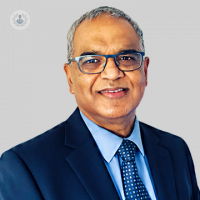Quick-fire questions about dry eye
Written in association with:Dry eyes can cause significant discomfort and problems which can cause disruption to daily life. Distinguished consultant ophthalmologist Mr Sivanandy Nagendran provides answers to commonly asked questions about the condition.

What are the symptoms of dry eye?
There are several signs and symptoms of dry eye, which may include a stinging or burning sensation, redness, sensitivity to light, and blurred vision. You may also notice a gritty feeling, as if something is in your eye, and excessive tearing, which may seem counterintuitive.
What causes dry eye?
There are various factors that contribute to dry eye, such as ageing, environmental conditions (wind, smoke), hormonal changes, and certain medications. Additionally, prolonged screen time and insufficient blinking can also contribute to dry eye.
How is dry eye diagnosed?
To diagnose dry eye, an eye doctor will perform a comprehensive eye examination, assessing your symptoms and using special tests to measure the quality and quantity of your tears. These tests help determine the most effective treatment plan.
What are the treatments for dry eye?
Treatment options for dry eye range from over-the-counter artificial tears to prescription medications that increase tear production or reduce inflammation. Lifestyle changes, like taking breaks during screen time and using a humidifier, can also provide relief. In severe cases, medical procedures may be recommended.
Can dry eye be prevented?
Although you cannot always prevent dry eye, you can reduce your risk by staying hydrated, maintaining a balanced diet rich in omega-3 fatty acids, and protecting your eyes from harsh environmental conditions. It is crucial to remember to blink regularly, particularly during prolonged periods of focus.
What are the long-term effects of dry eye?
Chronic dry eye can lead to more severe complications, including damage to the surface of the eye and an increased risk of eye infections. Seeking early treatment can help prevent long-term consequences.
Can dry eye cause vision problems?
In some cases, untreated dry eye may contribute to temporary fluctuations in vision. However, addressing dry eye symptoms promptly can often prevent a significant impact on your vision.
When should I see an eye doctor about dry eye?
If you experience persistent symptoms such as discomfort, redness, or changes in vision, it's crucial to schedule an appointment with an eye doctor. Early intervention can alleviate symptoms and prevent potential complications.
If you would like to book a consultation with Mr Nagendran, do not hesitate to do so by visiting his Top Doctors profile today.


